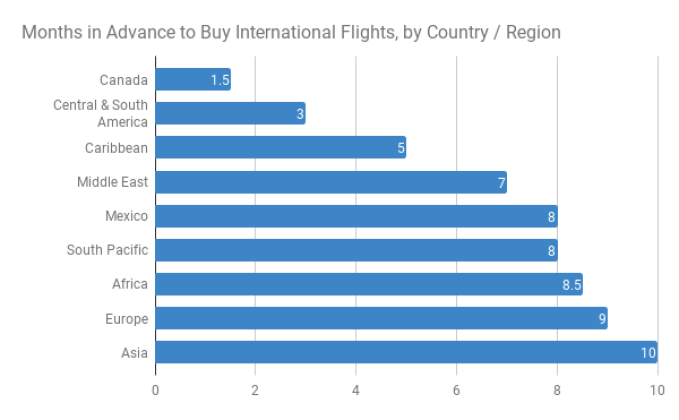
There are lots of tricks to getting the best price on your flight, but purchasing during the right timeframe is one of the easiest and most effective ways to make the most of your travel dollars. The timing depends on several variables, including if you are traveling domestically or internationally, time of year and whether or not it’s a holiday season. You’ll need to book well in advance if you’re traveling for a specific large event like the Olympics or the Super Bowl.
This post has a breakdown for when to buy both domestic and international tickets but if you want more secrets to finagling an awesome airfare deal, I share some other useful tips in my post 5 Tricks to Scoring the Cheapest Airfare.
Domestic Flights
According to Travel & Leisure, the best time to buy a domestic ticket is between three months and six weeks in advance. The article is linked above but here are the findings, in a nutshell:
- Domestic flight prices are generally lowest between 3 months and 6 weeks before departure
- Last minute fares – those booked within a week of travel – are 25% more expensive
I know from personal experience that late bookings are not a good deal. I’ve purchased tons of last minute travel in my work as an executive assistant. Although I was always hopeful that buying the day before would yield a fire sale to fill empty seats, never once did that happen – in over a decade of trying. The wait and see strategy is not a good idea when it comes to booking airfare. Once you’ve slid past the best booking window, prices will almost always continue to increase until the date of your trip.

TIP:
Airlines allow you to cancel or change your flight within 24 hours of booking (as long as you buy at least seven days in advance). So you can grab a seat on a potential flight and have a whole day to decide if you really want it. Just don’t forget to make a final decision before the clock runs out!
International Flights
The best time to buy international flights is usually much earlier than for domestic ones. According to a study by Cheapair.com, prices tend to stay relatively flat immediately after being offered for sale, until the date gets a bit closer and they start to go up. The graph below shows the best times to book for lowest fares, broken out by area, and assuming that you’re departing from the U.S.

As you can see, the timeframe varies considerably based on what region of the world you’re traveling to, but it never hurts to start your search as soon as possible and then continue to watch prices. You can use a fare watching service like FareCompare or AirfareWatchdog to keep tabs on prices for you, and then buy when they come within an acceptable range.
I have been watching airfare prices for a trip to Paris that my husband, Brian, and I are taking for our five year anniversary. Tickets were $1,450 three months ago and now, just one month out, they’ve gone up by over $100 to $1,577! Luckily, I got our tickets for just $750 each. 😀
Holidays
Start your search several weeks earlier than you normally would if you’re planning travel during a busy season, like winter holidays or spring break. Flights will fill up faster and as the seats are sold, the prices will continue to increase. If you’re antsy about booking something so far in advance, you can purchase travel insurance in case you need to cancel or change your trip. You’ll want to weigh the cost of your “earlybird” ticket + travel insurance against what you could be paying if you wait until closer to your travel date. You’ll often be better served by buying early at a discount and paying extra for insurance.
I Know When to Buy, But WHEN Should I Buy?
If you want to get really granular about things, we can talk about specific days of the week or times of day that have cheaper prices but the truth is that there is no real pattern for this. It’s possible to find a few dollars’ variance from day to day or time to time but these won’t be reliable or repeatable. You’re better off paying attention to the general window of time for purchasing, versus concentrating on the actual moment you click the “buy” button.

Timelines for purchasing flights are not an exact science. These windows are good suggestions for when you might want to start looking in earnest for your ticket, but there are exceptions to every rule. Use your best judgment and keep in mind Roosevelt’s sage observation that “Comparison is the thief of joy.” If you buy a ticket that you feel good about, that’s all that really matters.
TIP:
Before purchasing from an aggregator like Kayak or Expedia, check with the airline to see if the price is similar. There is evidence that airlines give preference to direct-booked flights when it comes to upgrades or even when choosing who to bump from a too-full airplane. Booking directly also makes it easier to get help from customer service if you miss your flight or connection or have other issues when traveling. If things go bad, the fewer parties there are in the mix, the harder it is to pass the buck.